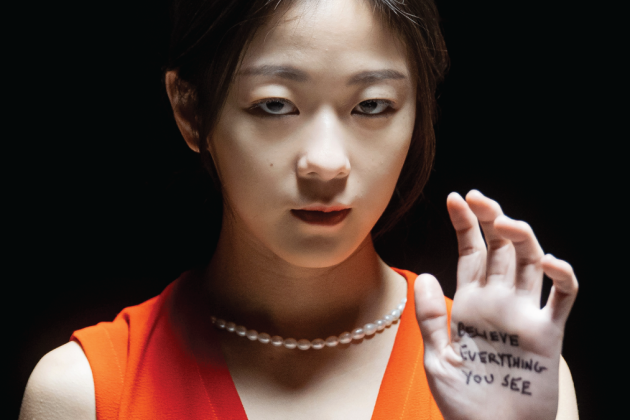Taiwan Content Raises Its Game as Festival VR Section Becomes Venice Immersive
- Oops!Something went wrong.Please try again later.

Taiwan’s ambition to impress has not dwindled despite its being the center of geopolitical struggle following Nancy Pelosi’s controversial visit. The island is still generating large amounts of content on the technological cutting edge.
It returns to the Venice Film Festival with a slate of productions ranging from the restored version of the late Edward Yang classic film “A Confucian Confusion,” work-in-progress film projects, as well as new VR, XR, and immersive content. These straddle the competition section and the Venice market.
More from Variety
Having demonstrated potential in previous years, this year’s Taiwan presentation in Venice is intended to move to another level.
It is no longer simply a matter of showcasing creative talents from the island, but about taking the lead in development and interpretation of the medium, says Izero Lee, CEO of the Taiwan Creative Content Agency (TAICCA). The body is an independent unit established under the Executive Yuan and the Ministry of Culture that has been promoting the island’s creative and content industries internationally in recent years.
The showcase also sets out new examples for investors—both commercial and institutional—of future possibilities of immersive content development.
“It is not limited to VR anymore, but also XR [expanded reality], and immersive content. We have seen more and more talents coming into this industry and we hope to foster more international co-productions while elevating the visibility of Taiwan productions,” said Lee.
The self-governed island has long been home to some of the world’s biggest tech companies in hardware and is the world’s biggest producer of advanced microchips. Increasingly, there is a focus on software.
After years of cultivation, an ecosystem combining tech development and content exploration has gradually been established, Lee says. Notable companies including Serendipity Films, HTC Vive Originals, Vive Arts, and Funique VR Studio are earning recognition in immersive content production. Many have received the support from TAICCA and the Kaohsiung Film Archive.
As global demand for visual technologies grows, so too may opportunities. Brogent Technologies, for example, has already been working with international companies including Legoland, Dreamworld in Australia, Europa-park in Germany, and FujiQ Highland in Japan. It is also a key partner of “Ghost in the Shell: Ghost Chaser,” a hexaRide transcendent theater attraction that debuted in 2018 at the Diver City Tokyo Plaza amusement venue in Japan, and was based on the 2015 animated feature film “Ghost in the Shell: The New Movie.” “VR is not just VR anymore” says Lee.
Technological advantages in hardware, software resources and technical skills are among Taiwan’s greatest strengths,” said Shane Wu, special assistant to the chairman at Brogent. “Talents with bold and creative ideas, as well as diverse public fundings can be found here. But most importantly, the open and free environment that embraces different voices, opinions and creativity are what allow our productions to flourish.”
Taiwan is no stranger to VR presentations in Venice—it even led last year’s VR section competition with seven titles, but the stage is growing. Venice has expanded and renamed the VR competition as ‘Venice Immersive.’ It now includes all means of creative expression in XR, ranging from 360-degree videos to live performances, installations, and virtual worlds. The titles from Taiwan reflect the latest evolution.
All three Taiwan titles competing in Venice Immersive explore the VR medium to its fullest and accommodate different variations of storytelling. “All That Remains,” is essentially a theatrical production. “The Man Who Couldn’t Leave” is a political drama backed by the National Human Rights Museum, while “Red Tail,” an animation, is a piece of original IP and also the second VR investment from Taiwan Public Television Service.
Commercial investors may not find the competition titles commercially, but as they offer other humanistic and cultural values they are able to find backing from other institutions.
“We are determined to invest in at least one VR production each year since 2018, and we are proud that both of our projects, “Great Hoax: The Moon Landing,” and “Red Tail” have garnered attention from the Venice Film Festival,” said Lee Shuping, controller of the drama section of PTS’s program department. “There might still be a long way to go to create a profitable business model for VR content, but investing in VR projects that we are proud of is the greatest return to a non-profit making TV station.”
Hung Shih-Fang, director of the National Human Rights Museum, says that the decision to commission “The Man Who Couldn’t Leave” was taken in order to raise the public’s awareness of the history of Taiwan’s White Terror period through a film narrative presented in an immersive format.
“We want the audience to understand what ‘white terror’ means, and we hope people can remember history so that they can cherish the freedom they have today,” Hung said. The project is also an example of the museum’s plans to include film viewing experiences as part of its program.
Outside of the competition section, TAICCA is also backing “Taiwan in Focus” at this year’s Production Bridge, supporting the Taiwan Pavilion at the Venice Immersive Market and presenting some 74 items of immersive content, projects, venues and tech companies.
“We hope that through our new model of participation in Venice this year, we can bridge the gap between the great talents from Taiwan’s VR industry and international players,” Lee said.
Best of Variety
From 'The Sandman' to 'Blonde': Books Made Into Movies and TV Series That You Should Read
Jennette McCurdy's Provocative Book 'I'm Glad My Mom Died' Is Already a No. 1 Bestseller
Sign up for Variety’s Newsletter. For the latest news, follow us on Facebook, Twitter, and Instagram.
